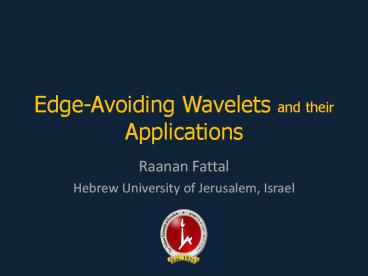Edge-Avoiding Wavelets and their Applications - PowerPoint PPT Presentation
Title: Edge-Avoiding Wavelets and their Applications
1
Edge-Avoiding Wavelets and their Applications
- Raanan Fattal
- Hebrew University of Jerusalem, Israel
2
Introduction
- Many image operations require scale separation
- Noise removal, DR compression, resolution
reduction, detail enhancement, image compression,
etc. - Linear translation-invariant (LTI) is the most
common one
3
Introduction
- Current affairs in LTI filtering
- Tradeoffs are well understood
- Transparent view in Fourier space
- Fast computing,
- Fast-Fourier Transform O(nlogn)
- Multi-scale computation O(n)
- Fast filter transforms for image processing,
Burt 1981 - Efficient Multi-scale versions (DWT, Laplacian
Pyramid, Dyadic WT) - Efficient O(n) solvers for implicit formulation,
- Multi-grid method (geometric)
- Multi-scale Preconditioned Conjugate Gradients
method
4
Introduction
- LTI filtering separates small variations based on
their scale, yet fails on large variations
Inter-scale correlations
band-independent dynamic range compression
5
Introduction
- Solution edge-preserving filtering or robust
smoothing - Bilateral filter weights chage in space
Combined
Result
Input
Graphs taken from Durand Dorsey 2002
Anisotropic Diffusion Perona and Malik 1990,
Black et al. 1998 Bilateral Filter Tomasi and
Manduchi, 1998 Digital TV filter Chan et al.
2001
6
Introduction
- Current affairs in data-dependent filtering
- Many possibilities for edge-stopping function
- Costly
- Non-linear anisotropic diffusion requires
multiple iterations - Bilateral filter additional dimensions Paris and
Durand 2005 - Costly multi-scale constructions
- Multi-scale Bilateral filter O(nlogn) Fattal et
al. 2007 - Weighted least squares O(nlogn) Farbman et al.
2008 - Implicit formulation yields poorly-conditioned
systems - Hierarchical preconditioning Szeliski 2006
7
Current Work
- A new family of data-dependent second-generation
wavelets allowing - Edge-preserving multi-scale construction in O(n)
time - Avoiding implicit formulations and
poorly-conditioned systems by explicit O(n)
transformation
8
Second-Generation Wavelets
- Classic wavelets theory
- Uniform notion of smoothness a single pair of
wavelet and scaling functions - Second-generation wavelets change in space
- Irregular sampling
- Boundary wavelets
- Domains with complicated geometry
- Image compression
- Constructed via data-prediction Harten 1993 and
lifting Sweldens 1993 schemes
9
Lifting Scheme
- Spatial biorthogonal wavelets generation scheme
- Three steps
- Split pick coarse and fine nodes
- Predict estimate fine from coarse
- Update preserve averages (smooth coarse nodes)
10
Example Constructing the (2,2)-CDF
- Define prediction by linear interpolation
CDF Wavelets are translation invariant No use of
Fourier, allowing easy spatial adaptations
11
Edge-Avoiding Wavelets
- Instead of TI regression formulae we use
posteriori robust predictions - with
- And also
12
Edge-Avoiding Wavelets
- Enjoy flexibility of lifting scheme to easily
handle boundaries - Computing weights loses the in-place (double data)
13
Inter-Scale Decorrelation
Edge-avoiding scaling func.
translation-invariant trans.
Edge-avoiding trans.
14
Applications
15
Dynamic Range Compression
- Switch to YUV color space
16
Dynamic Range Compression
Explicit computation no need to solve
inhomogeneous Poisson equations 12ms for 1Mpixel
image x5 faster than single-scale Durand and
Dorsey 2002 x200 faster than Farbman et al.
2008,
17
Dynamic Range Compression
Band-independent processing, no gain control
needed
Gain Control Li et al. 2005
WRB EA wavelets
18
Detail Enhancement
Input
WRB EA wavelets
Farbman et al. 2008
19
Detail Enhancement
Input
WRB EA wavelets
Farbman et al. 2008
20
Edge-Preserving Smoothing
Input
subsampling reduces O(nlogn) computation to
O(n) no quality costs
WRB EA wavelets
Farbman et al. 2008
21
Edge-Aware Interpolation
- EA Scaling functions contain input edge data
- Pull-push scheme Gortler et al. 19931996
edge
1D example
pull
push
Computed in linear-time O(n)
22
Edge-Aware Interpolation Colorization
Input
Levin et al. 2004
WRB EAW
Explicit computation avoids solving
poorly-conditioned inhomogeneous Poisson
equations (x200 faster than Levin et al. 2004
using Szeliski 2006)
23
Conclusions
- Combined two proven methodologies
- Enjoy the FAST performance of the cascade
algorithm - Decompose to robust decorrelated image
coordinates - Multi-scale edge-preserving decomposition in
O(N) - Match computational lightness of LTI/MS-LTI
- Accelerate data-dependent implicit formulations
by explicit computations
24
- Thank you!
- Thanks to Mike Werman and Dani Lischinski
25
Edge-Aware Interpolation De-colorization
26
WCDF Compared to WRB
WRB
WCDF
27
Amiram Harten 1947-1994
- Tel Aviv University, app. math. dept.
- Hyperbolic solvers
- TVD schemes and ENO schemes
- Data-prediction schemes
- Multiresolution representation of data a
general framework - Wikipedia the article on ENO, titled, Uniformly
High Order Accurate Essentially Non-oscillatory
Schemes, III was published in Journal of
Computational Physics, in 1987 and is one of the
most cited papers in the field of scientific
computing
Stanley Osher
28
Two 2D Constructions
- Weighted (2,2)-CDF each axis separately
- Weighted Red-Black (WRB) quincunx lattice
29
Dynamic Range Compression
Rainhard et al. 2002
WRB EA wavelets
Durand and Dorsey 2002
30
Detail Enhancement
Farbman et al. 2008
Input
Fattal et al. 2007
WRB EA wavelets































